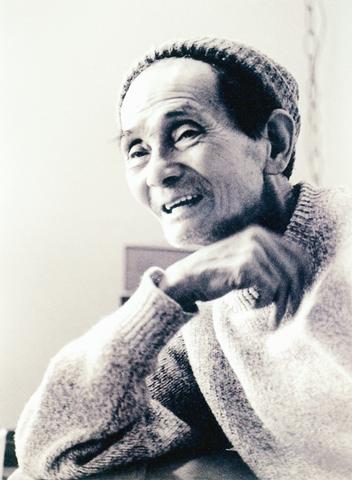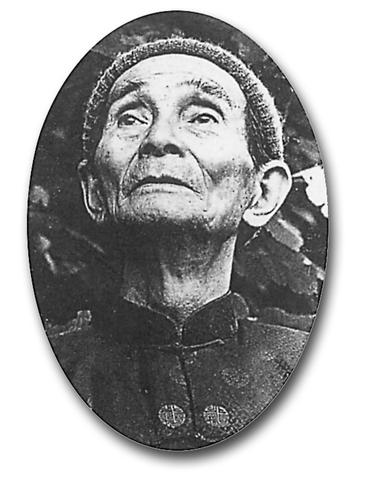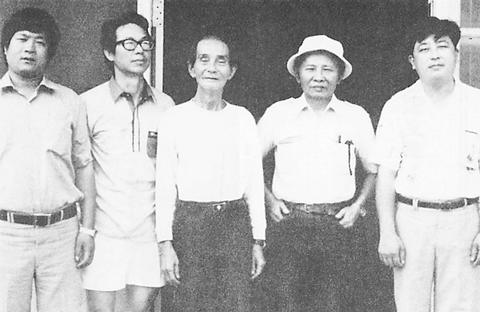Taiwanese author Yang Kui (
Years later he would wryly remark that he "is the best-rewarded writer in the history of Taiwan, averaging a five-day jail term per word."

PHOTO COURTESY OF THE NATIONAL CULTURAL HERITAGE PRESERVATION RE
According to the prominent Hakka writer Chung Chau-cheng (

Chung said Yang not only expressed his opposition to repressive Japanese colonial rule, but was also motivated by a strong sense of class-consciousness, which greatly enlightened writers of subsequent generations.
Born into a tinsmith's family in Tainan, Yang witnessed the 1915 Tapani Massacre by the Japanese (

PHOTO: COURTESY OF AVANT GRADE PUBLISHING CO
As a teenager, Yang was interested in Japanese, Russian and Western realist literature, such as Victor Hugo's Les Miserables, and became engrossed in their themes of humanism.
He fled to Japan in 1924 to escape an arranged marriage and there continued his studies. While in Japan, Yang was deeply impressed by the mainstream development of socialism.
"Yang was a true believer in Marxism, but not dogmatic. He used his literary works to deal with class and racial issues of his time, vividly expressing his stern opposition to colonialism and imperialism," said Chen Fang-ming (
In Japan, Yang worked his way through college as a newspaper boy and a part-time cement worker -- experiences that would later provide the backdrops to his novels. He was arrested for the first time on a charge of participating in a demonstration, but spent only three days in jail.
In 1927, at the request of farmers' organizations, Yang returned to Taiwan to join forces with them in promoting farmers' movements. Beginning from this time, Yang and his wife Yeh Tao (
Yang was honored in 1934 as the first Taiwanese writer to receive the Literary Criticism Award with his book The Newspaper Boy (
The Newspaper Boy, written in 1932 in Japanese, tells the story of Taiwanese newspaper boys' miserable lives and exploitation at the hands of a Japanese newspaper owner, who is eventually brought down when the workers go on strike for better pay and working conditions. The novel not only was an open rebuke of capitalism, but also centered on class struggle and conflict.
"The confrontation [presented in Yang's work] was not an oversimplified story of disadvantaged Taiwanese and advantaged Japanese. The story was complicated by human nature," said Yang's granddaughter, Yang Tsui (
Yang devoted his youth to farmers' movements in the 1930s and took charge in the movements' organization, earning praise as a pioneer of so-called "committed literature" (參與的文學) in Taiwan, a genre which usually depicts the poverty and misery of the poor and disenfranchised. Yang's strong opposition to capitalism even led him to name his first son Yang Tzu-beng (楊資崩), the son's given name translating as "the collapse of capitalism."
"Yang was not all talk and no action. He used his novels to correct the erroneous history forced on people by their rulers, and, moreover, he exerted his leadership on farmers' organizations," said Lin Juei-min (林瑞明), professor of Taiwanese literature at National Cheng Kung University.
Yang's legacy is simultaneously one of a social activist and of a man of letters.
"Yang's importance in the social movement outweighed that of his literary achievement," said writer Tseng Ching-wen (
Other critics, however, see a literary giant in Yang's writings.
Chen of Chengchi University cites, for example, Yang's masterpiece In Bud (
Yang continued to be as outspoken and radical under KMT rule as he was under Japanese colonial rule, Chen said. He introduced works by China's leftist writer Lu Xun (魯迅) to Taiwan, was highly critical of the KMT's policy to promote Mandarin and even encouraged young people in Taiwan to organize self-defense corps to fight the KMT, all of which could have earned him a death sentence.
To silence him, the KMT tried locking him up. But even that did not work. During his 12-year imprisonment on Green Island (綠島), which began in 1949, Yang wrote letters home, literary works on the jail wall and critiques dubbed "roses that cannot be squelched" (壓不扁的玫瑰).
Yang finished his days at his own Tonghai Garden (
"Yang was a very quiet person. He could read at his desk without uttering a word all day," said Lin, who spent a year with Yang.
Yang's granddaughter described the writer as a typical Taiwanese grandfather, who was at times childlike. "He was a very innocent, romantic and optimistic person, who insisted on distancing himself from power," she said, summing up the man's three driving motivations in life as knowledge, labor and social movements.

Last week the story of the giant illegal crater dug in Kaohsiung’s Meinong District (美濃) emerged into the public consciousness. The site was used for sand and gravel extraction, and then filled with construction waste. Locals referred to it sardonically as the “Meinong Grand Canyon,” according to media reports, because it was 2 hectares in length and 10 meters deep. The land involved included both state-owned and local farm land. Local media said that the site had generated NT$300 million in profits, against fines of a few million and the loss of some excavators. OFFICIAL CORRUPTION? The site had been seized

Next week, candidates will officially register to run for chair of the Chinese Nationalist Party (KMT). By the end of Friday, we will know who has registered for the Oct. 18 election. The number of declared candidates has been fluctuating daily. Some candidates registering may be disqualified, so the final list may be in flux for weeks. The list of likely candidates ranges from deep blue to deeper blue to deepest blue, bordering on red (pro-Chinese Communist Party, CCP). Unless current Chairman Eric Chu (朱立倫) can be convinced to run for re-election, the party looks likely to shift towards more hardline

Sept. 15 to Sept. 21 A Bhutanese princess caught at Taoyuan Airport with 22 rhino horns — worth about NT$31 million today — might have been just another curious front-page story. But the Sept. 17, 1993 incident came at a sensitive moment. Taiwan, dubbed “Die-wan” by the British conservationist group Environmental Investigation Agency (EIA), was under international fire for being a major hub for rhino horn. Just 10 days earlier, US secretary of the interior Bruce Babbitt had recommended sanctions against Taiwan for its “failure to end its participation in rhinoceros horn trade.” Even though Taiwan had restricted imports since 1985 and enacted

The depressing numbers continue to pile up, like casualty lists after a lost battle. This week, after the government announced the 19th straight month of population decline, the Ministry of the Interior said that Taiwan is expected to lose 6.67 million workers in two waves of retirement over the next 15 years. According to the Ministry of Labor (MOL), Taiwan has a workforce of 11.6 million (as of July). The over-15 population was 20.244 million last year. EARLY RETIREMENT Early retirement is going to make these waves a tsunami. According to the Directorate General of Budget Accounting and Statistics (DGBAS), the